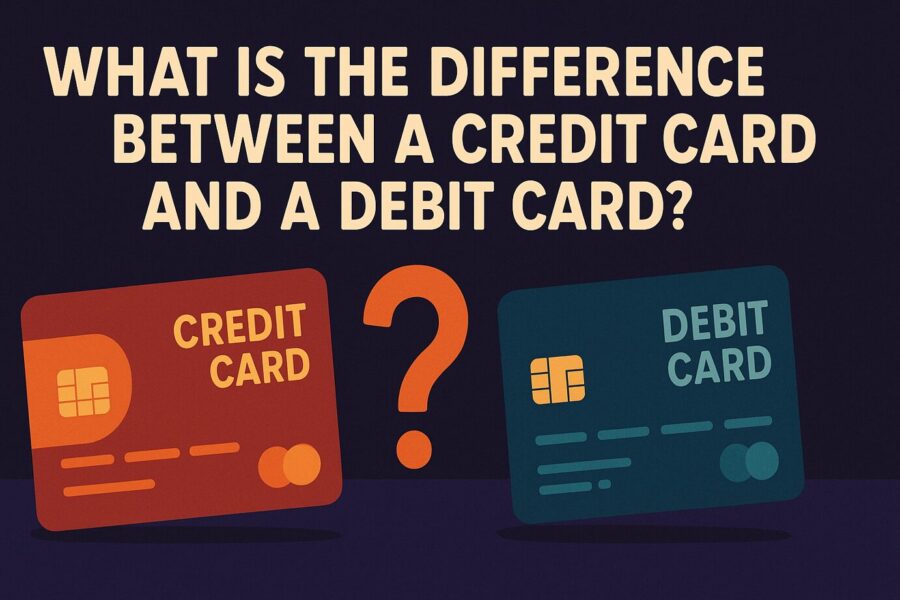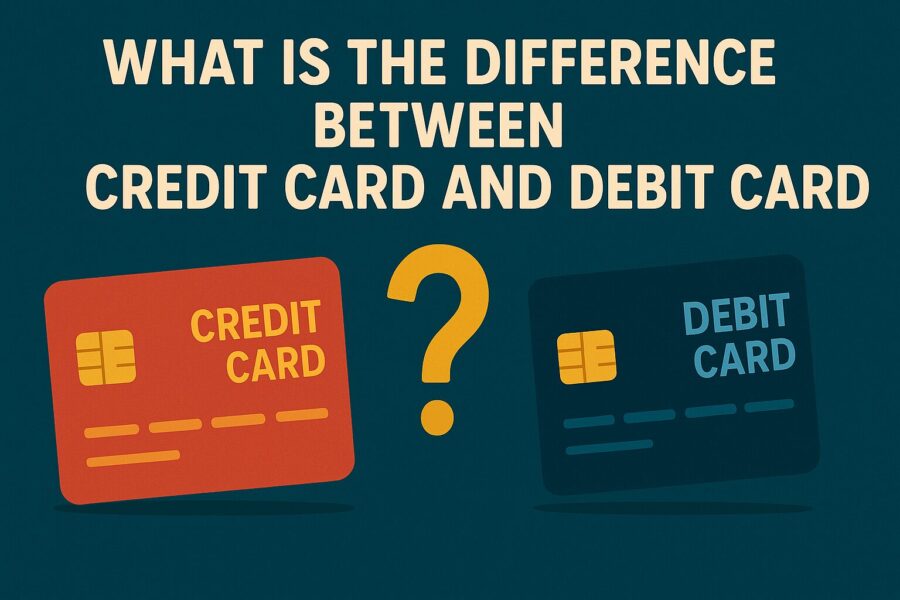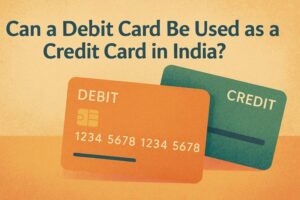What is the Difference Between a Credit Card and a Debit Card?
- 11 Nov 25
- 7 mins

What is the Difference Between a Credit Card and a Debit Card?
Key Takeaways
- The key difference between credit card and debit card lies in payment nature, debit cards use your own money, while credit cards let you borrow.
- Debit cards help control spending and avoid debt, while credit cards build credit scores through timely repayments.
- Credit cards offer rewards, cashback, and interest-free periods, unlike debit cards with limited benefits.
- Debit cards ensure safety with PIN and SMS alerts, whereas credit cards include zero-liability protection.
- Understanding the difference between credit card and debit card helps you choose based on your spending habits and financial goals.
In today’s digital payment era, credit cards and debit cards have become an essential part of everyday life. Rising incomes and the desire for an enhanced lifestyle have further increased their demand. For instance, in May 2025, the total credit card transactions in India amounted to ₹1.89 trillion, indicating a jump of 14.5% compared to the previous calendar year.
Conversely, many people use debit cards as well, as they provide quick cash access facilities from nearby ATMs. Here, the question arises: what is the difference between a debit card and a credit card? Well, read this blog to get a detailed answer.
What is the Difference Between Credit Card and Debit Card?

| Point of Difference | Debit Cards | Credit Cards |
| Spending Limits | Cardholders are assigned a daily limit on both cash withdrawals and spending. | Although daily limits apply to cash withdrawals, your credit limit is determined every month. |
| Annual Fee | Generally low or nil | Joining and yearly fees depend on the particular card variant |
| Nature of Payment | Whatever amount you spend is instantly deducted from your bank account | You get buy now, pay later facilities and can enjoy a specific interest-free credit period |
| Repayment | No repayment is required | Repay partly or wholly within the interest-free period to avoid additional charges. |
| Security Features | To track transactions, you get SMS, PIN and OTP facilities | Besides the basic features, zero liability insurance is added to a stolen or lost card |
Please note that Annual Percentage Rates (APRs) of credit cards vary from one issuer to another. Additionally, your card variant also influences this.
For instance, both the Diners Club Black Credit Card and the Regalia Credit Card are issued by HDFC Bank. However, the Diners Club Black Credit Card comes with an interest rate of 1.99% per month, while the Regalia Credit Card charges 3.75% interest. Thus, besides checking the individual card features, kindly review the fees and charges too to make a well-informed decision.
How Using Debit Cards Can Benefit You?
If you are thinking whether using a debit card will benefit you, then read below:
- Added Convenience: With a debit card, you have direct access to the cash deposited in your bank account. It reduces the hassle of carrying excessive cash for in-store payments and makes online transactions much easier.
- More Control Over Budget: Debit cards are very helpful because they encourage people to stay mindful while spending. So, you are directly prevented from debt accumulation and overspending.
- Easy Eligibility: Obtaining a debit card is much easier than getting a credit card. Simply by opening a bank account, you can choose from various card types available.
- Safety: All debit cards support PIN protection, and most of them come with embedded chips. Moreover, you receive SMS notifications for every transaction, thereby ensuring end-to-end fraud protection.
Are There Any Disadvantages of Using a Debit Card?
Recent reports suggest that Indians now collectively hold over 1 billion debit cards. This increased adoption clearly indicates that there are not many disadvantages to owning it. However, you still need to keep the following aspects in mind for safe usage:
- Limited Protection: If any unauthorised transaction occurs via your debit card (though unlikely), it will result in immediate deductions. An investigation will follow after you report the case, and the process can be pretty lengthy.
- Less Reward Points: Unlike credit cards, most debit cards do not have comprehensive rewards programs.
- No Credit Building: Building strong creditworthiness requires more than just using a debit card. It can affect your chances of borrowing when you need a loan later.
How Using Credit Cards Can Benefit You?

Credit cards provide consistent savings over time. For instance, if a card offers 5% cashback on grocery expenses and, on average, you spend ₹15,000 each month, you can save up to ₹750. In addition to cashback, discounts and rewards, you can also avail:
- Payment Flexibility: For both offline and online expenses, credit cards offer greater convenience. You do not have to worry about extra ATM withdrawals with a suitable credit card.
- Interest-Free Borrowing: Most cards allow you to repay the borrowed amount without any added interest within a period of 50 days.
- Building Credit Score: If you use your credit cards thoughtfully, you can improve your credit score. It is an essential aspect for reduced interest rates and better borrowing terms in future.
- Quick Access to Emergency Funds: During financial emergencies, a credit card acts like a safety net. You can pay immediately and convert the outstanding amount into flexible EMIs.
Are There Any Disadvantages of Using a Credit Card?
According to a CRIF Highmark report, as of March 2025, 15% of defaulters were identified as having failed to repay their pending overdues within 90 days. That being said, a growing concern is that some credit cardholders can run into significant debt if they do not pay their credit balance in full every month. Other disadvantages include:
- Overspending: As funds are quickly accessible, it can tempt you to spend more. This is the main reason why most people incur debt by not properly repaying their instalments.
- Associated Fees: The overall cost of credit card use can exceed your budget if you ignore the card's interest charges, late payment charges, penalties for cash advances, fuel surcharges, and so on.
- Negative Impact on Credit History: A consistently high credit utilization ratio or late repayments can negatively impact one’s credit score.
Which is Better: A Debit Card or a Credit Card?
Simply going through the differences between a debit card and a credit card is not sufficient when you try to determine which one will work better for you. You should identify your overall spending behaviour and existing liabilities to understand which one best suits your needs.
Next, you need to compare cards, primarily based on the following two aspects:
- Lifestyle privileges, free insurance, dining rewards and entertainment offers
- Card control options to manage ATM, offline, online and international transactions
Usually, credit cards are more favourable for active spenders. They offer rewards that are much better than debit cards. On the other hand, debit cards are more reliable when you do not have a precise budget estimate and also lack a proven borrowing record. The ideal approach is to use them in combination, allowing you to make your everyday payments seamless and hassle-free.
💡Pay your credit card bills in an easy and secure way with the PICE App.
Conclusion
The difference between a debit card and a credit card lies in how you spend and repay money. Debit cards draw money from your bank balance instantly, promoting discipline, whereas credit cards offer borrowing power and rewards but require careful management. Knowing the fundamental differences empowers you to optimise your spending and protect your financial health.
 By
By 

















